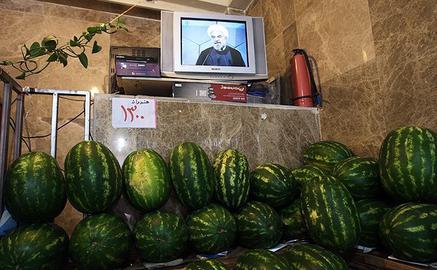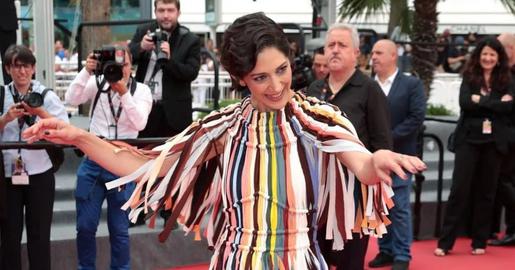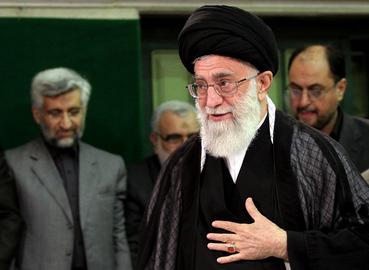Although the third debate amongst the eight presidential candidates was not much different than the two previous ones in form, its entanglement with the challenging core issues of the country's politics offered a candid, rare and exciting afternoon to Iranian viewers. But how did the candidates fare in this difficult arena?
Mohammad Bagher Qalibaf: Without a doubt, he was the big loser tonight. His profound mistake, made without any prelude or reason, was to attack Hassan Rowhani, the candidate with whom he shares most of his votes (Rowhani is competing closely with Qalibaf for attracting the middle class vote). Qalibaf accused Rowhani of hypocrisy in political conflict of all things, in reference to an event in which Qalibaf himself was recently implicated. Qalibaf recently exposed his own role in the crackdown on student protesters in 1999, admitting during a speech that he wielded a wooden baton against the protesters while riding on one of the motorcycles used by plainclothes forces to attack and injure those demonstrating.
In the debate, Hassan Rowhani adorned Qalibaf with the title of “The Ambusher,” reminding him that contrary to the comments he was making at the debate, showing himself to be conciliatory and caring to the students during a time of conflict, he was the one who had actually suggested to senior officials at the Supreme National Security Council to allow the students to demonstrate, and then to ambush and confront them. Qalibaf learned tonight that in the political arena, experience with operational and mayoral duties alone would not save him. He will need to proceed with far sharper calculation. In the latter parts of the debate, Qalibaf also attacked Velayati, effectively canceling out his political alliance with the supreme leader's key advisor. The mistake was costly and poorly calculated, it failed to dazzle viewers and undermined an important political relationship.
Saeed Jalili: The veritable punching bag of the debate, Jalili experienced one of the hardest nights of his life. Even though he showed some success a few times in coordinated moves with Haddad Adel in attacking the reformists, when it came to his career-long report card, the explicit criticism of the nuclear program by Rezai, Velayati, and Rowhani showed his emptiness and incapacity. In the style of his previous debate appearances, Jalili indirectly defended the Ahmadinejad government and proved that in some areas he is the exact replica of Mahmoud. Jalili also tried abundantly to show himself close to the views of the Supreme Leader, despite the fact that his critics were Principlists close to the Leader themselves. To his extremist supporters Jalili came across as a heroic figure, but to millions of Iranians he appeared as the very cause of more intense sanctions.
Gholamali Haddad Adel: Much stronger than his previous debates, he defended the system and the Supreme Leader of the Islamic Republic. He was also steadfast in his defense of the Principlists. His unexpected attacks on Velayati, which were numerous and countered by Velayati’s harsh reactions, were among the most sensational aspects of the final debate. Haddad Adel's surprise jousting also effectively ended the three-way coalition of Haddad Adel, Velayati, and Qalibaf. What's sharp about Haddad Adel is that he speaks to his own specific audience, and does not care what his opponents or critics think about him. Assuming that he has two-million votes, he completely consolidated these two-million votes in the final debate. The similarities of his opinions with those of Jalili also showed clearly that his proposed alliance with Velayati and Qalibaf was at best superficial.
Ali Akbar Velayati: the sensation of the final tonight, fighting on several fronts. He tried to defend the Principlists against Aref and Rowhani, to defend his foreign policy against Rezaei and Qalibaf, to talk about the logic of his politics against Haddad Adel, and to discuss the management of the nuclear program with Jalili. He was very successful in the latter and almost succeeded in throwing Jalili into the corner of the ring. Considering their common positions, both serving as advisors to Supreme Leader Ali Khamenei, his harsh and explicit criticism of Haddad Adel was also unexpected. He provided a much more biting, authoritative criticism than that of Rowhani and Mohammad Reza Aref’s of the management of the nuclear program in the recent years.
Hassan Rowhani: Rowhani appeared to be stronger than his previous debate, especially in confronting Qalibaf, giving his supporters a giant boost. But he did not engage with the nuclear discussion in an earnest way and preferred to be an onlooker in the discussions between Saeed Jalili and Ali Akbar Velayati. His tactic, shared with Aref, was to let the Principalists fight it out, but the two of them could have shown the gaps more vividly by participating in the discussions. His powerful confrontation and expose of Mohsen Rezaei was also one of the pivotal moments of tonight’s debate.
Mohammad Reza Aref: He started strong but his strength diminished as the debate went on and he eventually lost his way. By referring to political arrests of the past few years at the debate's onset, he promised a stormy night, but going forward he stopped short and ultimately became reclusive, confirming Jalili’s narrative of the events of 2009. He too didn't engage in discussion about the nuclear program, but, like during the previous debate, continued his confrontations with Haddad Adel. A few times Haddad Adel made comments about Mousavi and Karroubi that could have provided him Aref with good openings, but he backed off from striking. Despite this, however, he was still able to show that his reformist colors were bolder than Hassan Rowhani’s, by making references to figures such as Khatami, Hassan Khomeini, and Mir Hossein Mousavi. Perhaps his most pivotal remarks were made in his conclusion. Aware of his urgent need for the boycotters to participate in this election, Aref told his potential voters: “Pouting and not voting is not a protest. It is a retreat.”
Mohsen Rezai: Rezai tried to distance himself from the fight between the Principlists and the Reformists, assuming a spirit of public friendship, and suggesting that he had the upper hand amongst the other candidates, provoking the irritation of Haddad Adel and Rowhani. In the challenge segment of the debate, he also spoke critically when facing off against Velayati and Jalili, and he almost turned this into a success. But he came up very short against Rowhani. Overall, in economics and political discussions, he expressed more slogans than substance.
Mohammad Gharazi: Gharazi was able to speak coherently for about 10 minutes, before his presentation broke into disarray again. He played very well the role of a demolisher against the reformists, and by posturing as an apolitical figure sought to create a different image for himself. Even so, he spoke so out of context and indistinctly that his efforts went unnoticed. He also demonstrated how quickly an apolitical manager can be sidestepped and marginalized in important discussions.




















comments